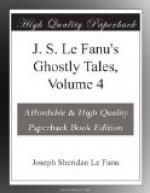* * * * *
THE GHOST AND THE BONE-SETTER
In looking over the papers of my late valued and respected friend, Francis Purcell, who for nearly fifty years discharged the arduous duties of a parish priest in the south of Ireland, I met with the following document. It is one of many such, for he was a curious and industrious collector of old local traditions—a commodity in which the quarter where he resided mightily abounded. The collection and arrangement of such legends was, as long as I can remember him, his hobby; but I had never learned that his love of the marvellous and whimsical had carried him so far as to prompt him to commit the results of his enquiries to writing, until, in the character of residuary legatee, his will put me in possession of all his manuscript papers. To such as may think the composing of such productions as these inconsistent with the character and habits of a country priest, it is necessary to observe, that there did exist a race of priests—those of the old school, a race now nearly extinct—whose habits were from many causes more refined, and whose tastes more literary than are those of the alumni of Maynooth.
It is perhaps necessary to add that the superstition illustrated by the following story, namely, that the corpse last buried is obliged, during his juniority of interment, to supply his brother tenants of the churchyard in which he lies, with fresh water to allay the burning thirst of purgatory, is prevalent throughout the south of Ireland. The writer can vouch for a case in which a respectable and wealthy farmer, on the borders of Tipperary, in tenderness to the corns of his departed helpmate, enclosed in her coffin two pair of brogues, a light and a heavy, the one for dry, the other for sloppy weather; seeking thus to mitigate the fatigues of her inevitable perambulations in procuring water, and administering it to the thirsty souls of purgatory. Fierce and desperate conflicts have ensued in the case of two funeral parties approaching the same churchyard together, each endeavouring to secure to his own dead priority of sepulture, and a consequent immunity from the tax levied upon the pedestrian powers of the last comer. An instance not long since occurred, in which one of two such parties, through fear of losing to their deceased friend this inestimable advantage, made their way to the churchyard by a short cut, and in violation of one of their strongest prejudices, actually threw the coffin over the wall, lest time should be lost in making their entrance through the gate. Innumerable instances of the same kind might be quoted, all tending to show how strongly, among the peasantry of the south, this superstition is entertained. However, I shall not detain the reader further, by any prefatory remarks, but shall proceed to lay before him the following:—




